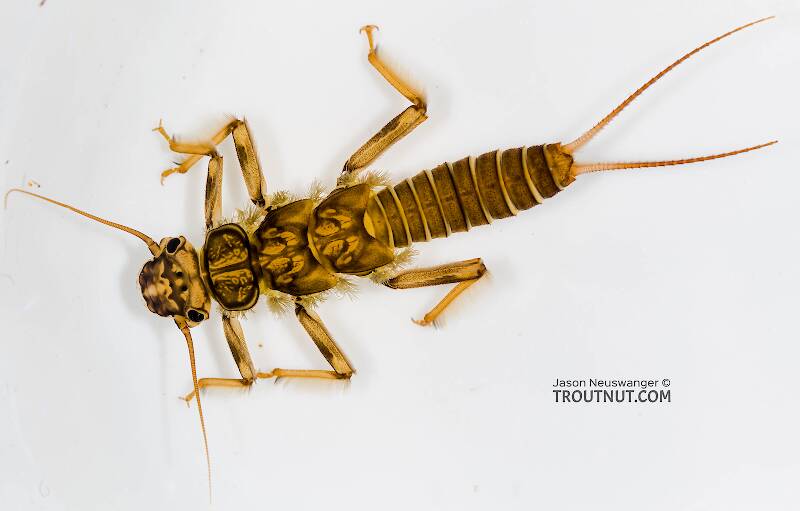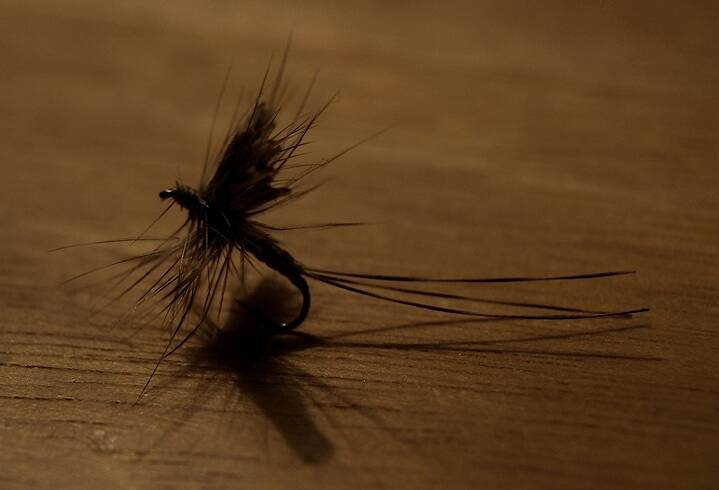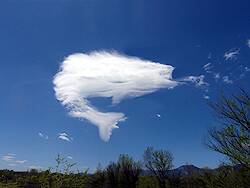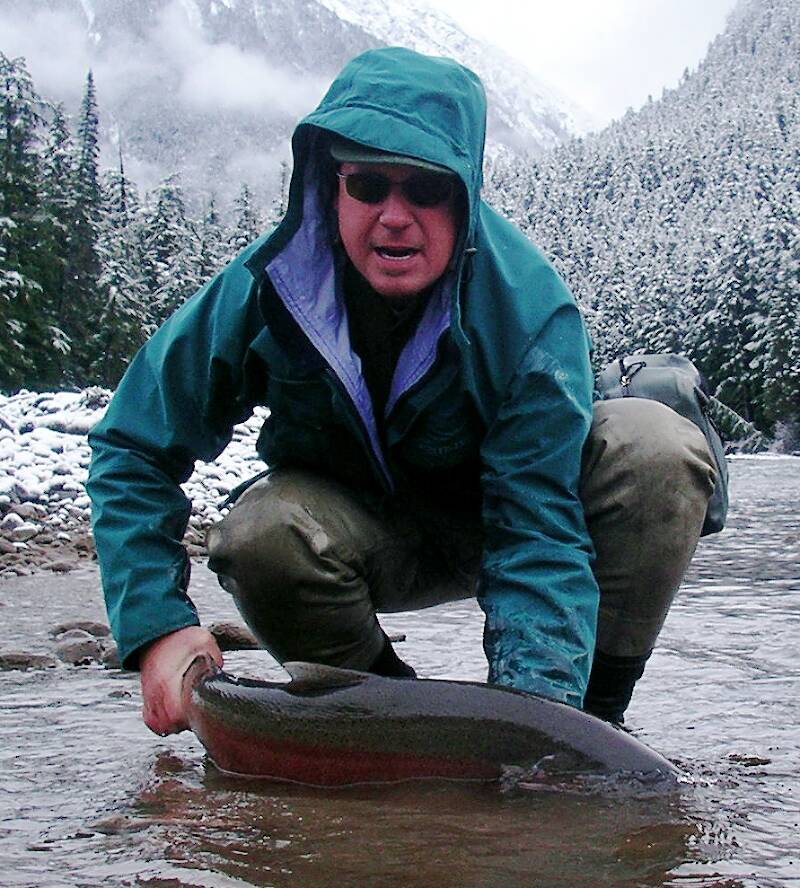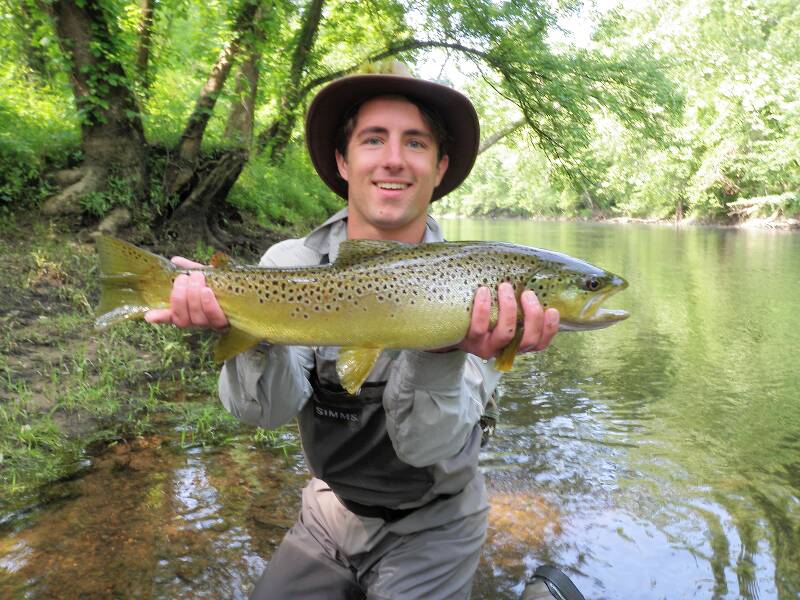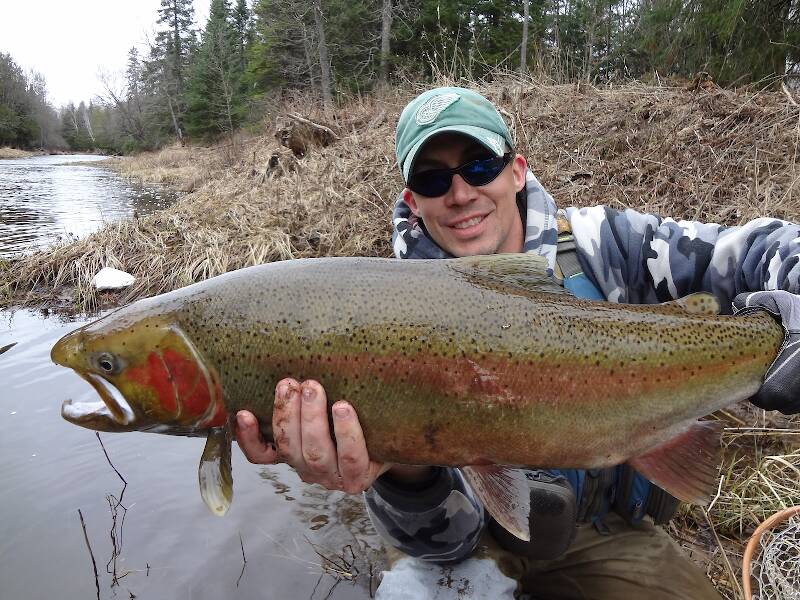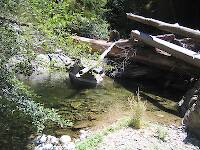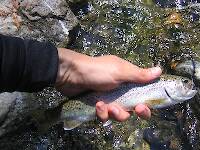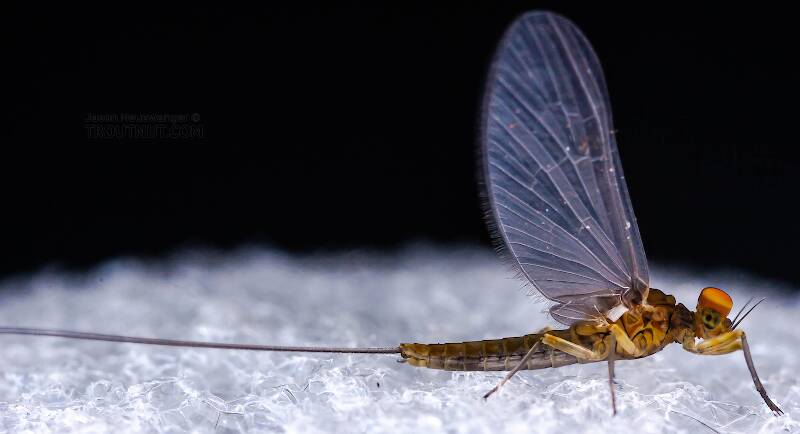
Blue-winged Olives
Baetis
Tiny Baetis mayflies are perhaps the most commonly encountered and imitated by anglers on all American trout streams due to their great abundance, widespread distribution, and trout-friendly emergence habits.
Featured on the forum

Troutnut is a project started in 2003 by salmonid ecologist Jason "Troutnut" Neuswanger to help anglers and
fly tyers unabashedly embrace the entomological side of the sport. Learn more about Troutnut or
support the project for an enhanced experience here.
Troutnut on Sep 18, 2006September 18th, 2006, 3:10 pm EDT
Today I fished a nice-looking pool in a remote small stream. The pool was about 30 yards long with a waterfall at the head and two deep spots holding fish: one small depression near the tail and the main, deep throat of the pool, which was about 1/4 of the way down from the head because of the bottom composition. It's not terribly deep below the waterfall because it's rock, but the rock drops off a ledge into about 3-4 feet of water where all the fish hold.
The water's crystal clear and the surface glassy smooth, and there are a couple dozen wild browns and/or rainbows up to 13 inches in the pool. I didn't catch any of them.
Here's my guess at what happened: I gave up quickly on the inactive fish near the tail, and waded into position for the other fish. I think this spooked the fish in the tail, which raced upstream to join the rest of them. I've read their spooked "posture" can signal danger to the other trout just as well as a deer's white tail. And I think that happened here, because the many trout near the head were just laying on the bottom and wouldn't take anything after I moved into casting position. (I saw a rise or two before that.)
I eventually gave up on casting there and waded up just to see that the fish weren't suckers, because it was my firs time at the pool and I did see some suckers swim by me in the tail. Sure enough, there were quite a few trout.
I'm really curious about how often we spook trout by spooking other trout, which swim away and set off the alarm. I think it may happen more than I've really noticed before. Anyone else have some interesting experience with this?
The water's crystal clear and the surface glassy smooth, and there are a couple dozen wild browns and/or rainbows up to 13 inches in the pool. I didn't catch any of them.
Here's my guess at what happened: I gave up quickly on the inactive fish near the tail, and waded into position for the other fish. I think this spooked the fish in the tail, which raced upstream to join the rest of them. I've read their spooked "posture" can signal danger to the other trout just as well as a deer's white tail. And I think that happened here, because the many trout near the head were just laying on the bottom and wouldn't take anything after I moved into casting position. (I saw a rise or two before that.)
I eventually gave up on casting there and waded up just to see that the fish weren't suckers, because it was my firs time at the pool and I did see some suckers swim by me in the tail. Sure enough, there were quite a few trout.
I'm really curious about how often we spook trout by spooking other trout, which swim away and set off the alarm. I think it may happen more than I've really noticed before. Anyone else have some interesting experience with this?
Jason Neuswanger, Ph.D.
Troutnut and salmonid ecologist
Troutnut and salmonid ecologist
Sasso on Sep 19, 2006September 19th, 2006, 3:14 am EDT
Nothing crazy interesting... but I've definitely seen it happen before. Spooking one can definitely trigger caution in the others - even if your well out of line of sight. I usually just sit idle and let 'em shed their spook before I start casting again... no harm in sitting and enjoying the scenery for a bit!
FisherOfMen on Feb 15, 2012February 15th, 2012, 5:09 pm EST
I hope I don't get a hard time for posting in such an old thread, but I see this all the time in Star Lake. In the Spring when they stock all the exactly 9 1/4 inch rainbows, they school by sunken logs. Casting Panther Martins will catch a few if you're careful, but as soon as one gets spooked, they all head for cover and absolutely refuse to come out until you leave.
It's kind of an amazing sight. You've got a school of say thirty or forty 9 inch trout in crystal clear water, and when they all simultaneously dart for the same log, its like a kaleidoscope exploded underwater!
It's kind of an amazing sight. You've got a school of say thirty or forty 9 inch trout in crystal clear water, and when they all simultaneously dart for the same log, its like a kaleidoscope exploded underwater!
"Nothing makes a fish bigger than almost being caught." -Author Unknown
All that is necessary for the triumph of evil is that good men do nothing. -Edmund Burke
All that is necessary for the triumph of evil is that good men do nothing. -Edmund Burke
PaulRoberts on Feb 15, 2012February 15th, 2012, 5:46 pm EST
A couple quotes from some of my trip reports that touch on this subject:
…
I crawled up, and bow-n-arrowed into the tailout, hooking and unceremoniously skipping a dancing little brown down and out, releasing it into the cut below. Now for the cast that matters. In fast mountain streams, and depending on insect activity and specific pool layout of course, tailouts more rarely hold good fish than they do in slower more fertile streams. Here, fishing the tailout is more a matter of removing the 6 or 7 inch potential pool spookers that are kept off the better lies further up the pool by larger fish. The next cast went to the back end of the basin and was met with a smacking rise. I paused, lifted, and a nice brown responded with a remarkably high tailspring, then another, and another, spitting the dry fly. But, I had previously attached a dropper nymph to the dry’s hook bend and, as not uncommonly happens, the dropper line slipped through the clenched mouth of the escaping trout and re-hooked it on the nymph. Another tailspring –which took the fish out through the tailout and into a tangle of willow roots below. My line hung lifeless in the air. I snatched it and said, “Rats!”, and then, “Wow!”
…
…
Normally I'd try to catch these tailout fish and pull em down and out so as not to alarm the rest of the pool. But this is less an issue on such turbulent high gradient streams than it often is in flatter gradient water, where a single spooked 6inch trout can freak out the entire pool. In these steeper waters, a small trout zipping up doesn’t ruin the pool, in fact it can even help me out. Some of my better fish for the day came when I missed or pricked a fish which caused it to bolt. A shift then occurred in drift site occupancy, and several times during the day a larger trout dropped down to occupy a station near the tailout, and into casting range. …
I've spent a fair amount of time watching anglers approach pools and watched the trout's reaction. Most anglers, unbeknownst to them, spook the majority of feeding fish before they even set to cast, or with their casts.
And as Sasso mentions, patience can make all the difference.
…
I crawled up, and bow-n-arrowed into the tailout, hooking and unceremoniously skipping a dancing little brown down and out, releasing it into the cut below. Now for the cast that matters. In fast mountain streams, and depending on insect activity and specific pool layout of course, tailouts more rarely hold good fish than they do in slower more fertile streams. Here, fishing the tailout is more a matter of removing the 6 or 7 inch potential pool spookers that are kept off the better lies further up the pool by larger fish. The next cast went to the back end of the basin and was met with a smacking rise. I paused, lifted, and a nice brown responded with a remarkably high tailspring, then another, and another, spitting the dry fly. But, I had previously attached a dropper nymph to the dry’s hook bend and, as not uncommonly happens, the dropper line slipped through the clenched mouth of the escaping trout and re-hooked it on the nymph. Another tailspring –which took the fish out through the tailout and into a tangle of willow roots below. My line hung lifeless in the air. I snatched it and said, “Rats!”, and then, “Wow!”
…
…
Normally I'd try to catch these tailout fish and pull em down and out so as not to alarm the rest of the pool. But this is less an issue on such turbulent high gradient streams than it often is in flatter gradient water, where a single spooked 6inch trout can freak out the entire pool. In these steeper waters, a small trout zipping up doesn’t ruin the pool, in fact it can even help me out. Some of my better fish for the day came when I missed or pricked a fish which caused it to bolt. A shift then occurred in drift site occupancy, and several times during the day a larger trout dropped down to occupy a station near the tailout, and into casting range. …
I've spent a fair amount of time watching anglers approach pools and watched the trout's reaction. Most anglers, unbeknownst to them, spook the majority of feeding fish before they even set to cast, or with their casts.
And as Sasso mentions, patience can make all the difference.
Entoman on Feb 15, 2012February 15th, 2012, 7:13 pm EST
Nick, that's good stuff from Paul. BTW - that's how to use "related discussions":)
"It's not that I find fishing so important, it's just that I find all other endeavors of Man equally unimportant... And not nearly as much fun!" Robert Traver, Anatomy of a Fisherman
FisherOfMen on Feb 16, 2012February 16th, 2012, 12:18 pm EST
BTW - that's how to use "related discussions":)
You mean on my part or Paul's?
"Nothing makes a fish bigger than almost being caught." -Author Unknown
All that is necessary for the triumph of evil is that good men do nothing. -Edmund Burke
All that is necessary for the triumph of evil is that good men do nothing. -Edmund Burke
Entoman on Feb 16, 2012February 16th, 2012, 1:09 pm EST
Yours! The topic interested you so you revived it. That's the whole point of related discussions, besides reading the posts that may relate. It's answering an old question that may be an oops moment. But even that could be interesting. An oops! moment would be answering an '06 question asking, "Anybody know if the runs are projected to be up or down this year?" with, "I don't think they've come out yet." :)
"It's not that I find fishing so important, it's just that I find all other endeavors of Man equally unimportant... And not nearly as much fun!" Robert Traver, Anatomy of a Fisherman
FisherOfMen on Feb 18, 2012February 18th, 2012, 9:12 am EST
Okee-dokee!
uh... in that case - thanks!
uh... in that case - thanks!
"Nothing makes a fish bigger than almost being caught." -Author Unknown
All that is necessary for the triumph of evil is that good men do nothing. -Edmund Burke
All that is necessary for the triumph of evil is that good men do nothing. -Edmund Burke
Jesse on Feb 18, 2012February 18th, 2012, 7:11 pm EST
It always make me laugh when, just as i think im one step away from being in the perfect position to make a cast to a great looking stretch of water, a trout bolts up past me. Then as i fish the pool i get frustrated because im not catching any fish in water that i know holds fish. I know that scared trout trigger trout to be cautious. There are instances, such as the ones mentioned above where the type of water the fish is lying might not affect other fish if he/she is spooked. But for a large portion of water once one peels away, the others in close proximity are scared now to. Look at it like this; one human runs through the mall scared, everyone gets scared. One bird panics in a field of many, the others fly away in panic. One deer runs through the woods with it's tail up, huffing, the others are now nervous. Get the picture!?
Most of us fish our whole lives..not knowing its not the fish that we are after.
http://www.filingoflyfishing.com
http://www.filingoflyfishing.com
Pryal74 on Feb 19, 2012February 19th, 2012, 12:55 pm EST
Trout have short memories. If or when I spook fish, I go and fish another stretch of water or give them at least a half hour to once again become placid. If you have even watched video of trout in nature or go to see them firsthand, they do in fact communicate by "body language" if you follow me. One spooked trout will more often than not, spook many others. I would suggest giving them more time and then take the stealthiest approach possible.
-James Pryal
Into The Wild Fly Fishing
Into The Wild Fly Fishing
PaulRoberts on Feb 19, 2012February 19th, 2012, 1:41 pm EST
Good stuff guys.
Yeah, trout do have short memories, usually happy to get back "as they were" asap. On some spots, where my best stealth just won't cut it, I may wade right in, and then wait ... 15 minutes usually does it for most trout. I've also moved trout and steelhead in impossible lies purposely, then come back and caught them.
Sometimes that "body language" is less like language than it is just startling everybody. That's how it is for trout like those I mentioned above that get re-positioned. They aren't aware of what spooked whom, and settle back into feeding quickly.
Herons have this game figured out.
Yeah, trout do have short memories, usually happy to get back "as they were" asap. On some spots, where my best stealth just won't cut it, I may wade right in, and then wait ... 15 minutes usually does it for most trout. I've also moved trout and steelhead in impossible lies purposely, then come back and caught them.
Sometimes that "body language" is less like language than it is just startling everybody. That's how it is for trout like those I mentioned above that get re-positioned. They aren't aware of what spooked whom, and settle back into feeding quickly.
Herons have this game figured out.
Quick Reply
Related Discussions
Topic
Replies
Last Reply


